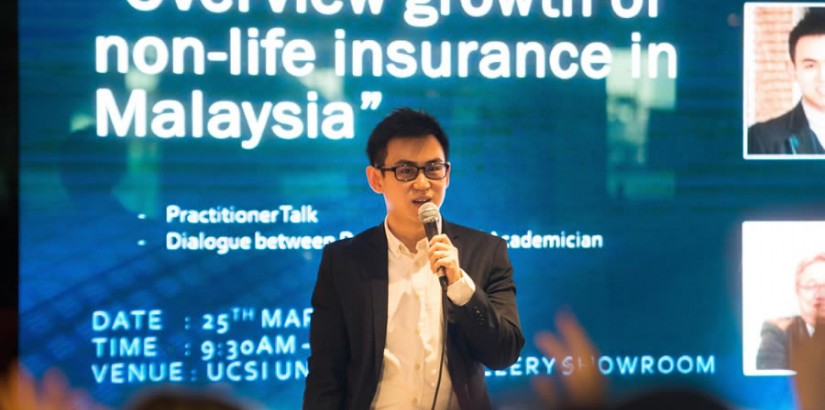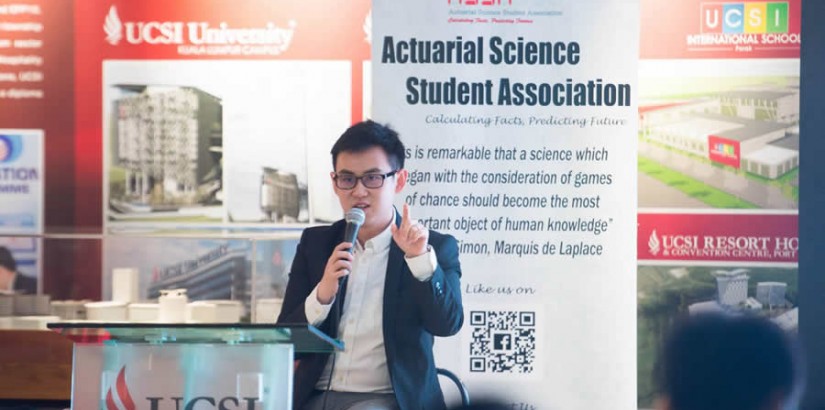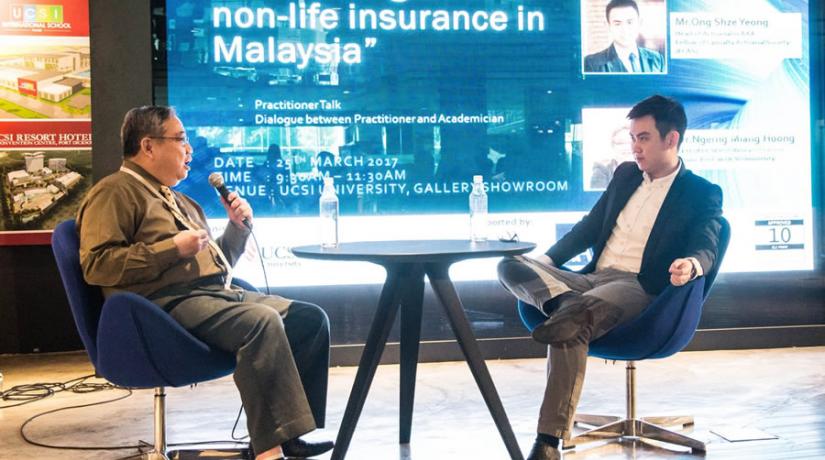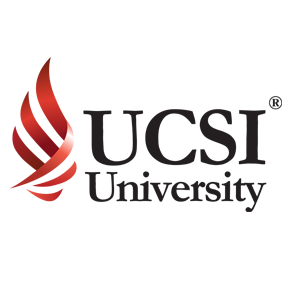2017
29 MarPractitioner Talk and Dialogue Session – “Growth of non-life insurance in Malaysia: An overview”


KUALA LUMPUR: Defined as any insurance that is not determined to be life insurance, the Malaysian non-life or general insurance industry is largely driven by automobile and homeowner policies which have seen to a collective RM17 billion in premium income and RM7 billion in net claims paid. While still far behind the established life insurance market, general insurance has been recording impressive growth rates over the past few years. In fact, market analysts have indicated that it is among the fastest emerging markets of the global insurance industry.
To provide an overview of this burgeoning industry and to discuss actuarial careers that may be charted within this field, UCSI University’s Department of Actuarial Science and Applied Statistics hosted a practitioner talk and dialogue session with Ong Shze Yeong, Head of Actuarial at AXA Affin General Insurance Berhad – one of the fastest growing general insurance companies in Malaysia and the leader in medical and health insurance.
Ong has eight years of experience in general insurance liability valuation, product pricing, capital, and reinsurance optimisation. He is also a Fellow of Casualty Actuarial Society (CAS), a CAS Ambassador for Malaysia, and a GI sub-committee member for Actuarial Society Malaysia (ASM).
"Growth in non-life insurance is mainly driven by product and distribution innovation opportunities in Malaysia," said Ong, whose role in AXA is to manage the valuation of reserves while providing analyses, trend reports, and insights to support various business units within the company.
"Today’s technological advancements and infrastructure development are just a few of the factors that must be leveraged upon to create products that address risks not effectively covered by the traditional insurance policies."
Ong was joined on stage by Associate Professor Dr Ngerng Miang Hong, CEO of UCSI Poll Research Centre and associate professor of quantitative finance and risk management, who provided an academic perspective to the discussion.
Ong emphasised the importance of research in developing non-life insurance products but acknowledged the difficulties that researchers and students face in obtaining local data, especially pertaining to medical and auto insurance.
Currently, ISM Insurance Services Malaysia Berhad (ISM) manages local databases which are shared only to contributing members. For a third party to gain access, all members of ISM have to consent to release the information.
“Data is limited and scarce,” said Ong. “Even as an ISM member, the data that we are able to download is selective and censored. However, we can definitely reach out to ASM to support this open access.”
Moving forward, both Ong and Assoc Prof Ngerng agreed that more dialogue between practitioners and academicians is needed to reach a mutually beneficial decision on how to better utilise the data resource – a key component for academic study to improve industry efficiency and standards of practice.
As product innovation and development is highly needed in the Malaysian insurance industry, Ong assured students that careers in non-life will be rewarding and shared the essential skills one would need.
“The most relevant are the CAS exams five to nine,” he said. “Those are really applied in your work in non-life. In terms of what you don’t, I have to say that my peers and I don’t use loss models much but it still helps that you understand the concept and know how to perform the technical calculations.”
UCSI will introduce courses on basic ratemaking process and computation to enhance the students’ competitiveness for those who are interested in pursuing careers in the non-life insurance industry. Ong encouraged them to perform well in their studies, to pass at least two to four preliminary exams, and to participate in campus activities to hone their leadership skills. For an even stronger start, he said that students should also focus on internships.
“It is valuable practical experience and I am more likely to hire someone who has interned for say, six months at an insurance company than someone with a higher CGPA,” he said.
“It’s not difficult to understand ratemaking and reserving so if you had interned for three months, you would at least have gotten some sense of the concepts. Stay longer and you would have gotten to interact with senior managers and start adding value to the work. All these are very important to your future employer.”
UCSI currently runs the country’s widest industry-academic network with over 4,000 partners providing two-month internships to students each academic year. Assoc Prof Ngerng said that the Faculty will definitely look into exploring longer internship durations so that students may better prepare themselves for the workforce.












